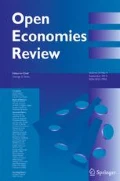Abstract
Why do large European banks lobby for monetary union? We show in a game-theoretic model that montary union can trigger a change in the structure of the market for international banking transactions with asymmetric effects on profits: large banks are induced to cooperate internationally and gain from European Monetary Union (EMU), while small banks are likely to lose. Monetary union can be interpreted as a device for large banks to push small banks out of the market for cross-border financial services.
Similar content being viewed by others
References
Baldwin, R.E. (1991) “On the Microeconomics of the European Monetary Union,”European Economy (special edition) 1, 21–35.
Bofinger, P. (1994) “Is Europe an Optimum Currency Area?” CEPR Discussion Paper 915, February.
BVR (Bundesverband der deutschen Volksbanken und Raiffeisenbanken).Annual Report, various issues.
Canals, J. (1993)Competitive Strategies in European Banking. Oxford: Clarendon Press.
Casella, A. (1992) “On Markets and Clubs: Economic and Political Integration of Regions with Unequal Productivity,”American Economic Review 82, 115–121.
Cohen, B.J. (1989) “European Financial Integration and National Banking Interests.” In P. Guerrieri and P.C. Padoan (eds.),The Political Economy of European Integration. New York: Harvester-Wheatsheaf, pp. 145–170.
Eichengreen B. (1993) “European Monetary Integration,”Journal of Economic Literature 31, 1321–1357.
Eichengreen, B. and J. Frieden (1993) “The Political Economy of European Monetary Unification: An Analytical Introduction,”Economics and Politics 5, 85–104.
Epstein, G. (1991) “Profit Squeeze, Rentier Squeeze and Macroeconomic Policy Under Fixed and Flexible Exchange Rates,”Economies et Sociétés 25.3, 219–257.
European Commission (1990)One Market, One Money, European Economy 44 (October).
Frieden J. (1991) “Invested Interests: The Politics of National Economic Policies in a World of Global Finance,”International Organization 45, 425–451.
Giovannini, A. (1993a) “Central Banking in a Monetary Union: Reflections on the Proposed Statute of the European Central Bank,”Carnegie-Rochester Conference Series on Public Policy 38, 191–230.
Giovannini, A. (1993b) “Economic and Monetary Union: What Happened?-Exploring the Political Dimension of Optimum Currency Areas.” InThe Monetary Future of Europe. London: Centre for Economic Policy Research.
Lipp, E.M., Ulrich Ramm, and Norbert Walter (1992) “Stellungnahme zum Manifest der über 60 Professoren über die Maastricht-Beschlüsse zue Europäischen Wirtschafts-und Währungsunion”. InAuszüge aus Presseartikeln, Deutsche Bundesbank, June 16, pp. 1–2.
Ruland, L.J. and J.-M. Viaene (1993) “The Political Choice of Exchange Rate Regimes,”Economics and Politics 5, 271–284.
Tavlas, G.S. (1993) “The ‘New’ Theory of Optimum Currency Areas,”World Economy 16, 663–685.
Vaubel, R. (1990) “Currency Competition and European Monetary Integration,”Economic Journal 100, 930–940.
Vives, X. (1991) “Banking Competition and European Integration.” In A. Giovannini and C. Mayer (eds.),European Financial Integration. Cambridge: Cambridge University Press, pp. 9–31.
Weber, M. (1993) “Die Europäische Währungsunion aus Sicht der deutschen Banken.” Manuscript, October.
Author information
Authors and Affiliations
Rights and permissions
About this article
Cite this article
Grüner, H.P., Hefeker, C. Bank cooperation and banking policy in a monetary union: A political-economy perspective on EMU. Open Econ Rev 7, 183–198 (1996). https://doi.org/10.1007/BF01886820
Issue Date:
DOI: https://doi.org/10.1007/BF01886820




